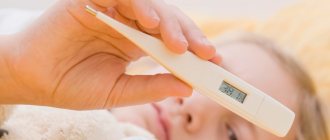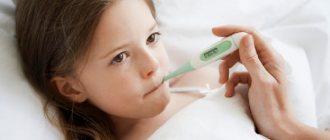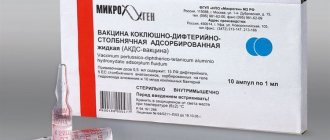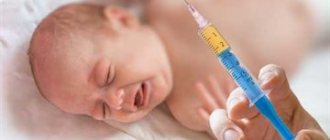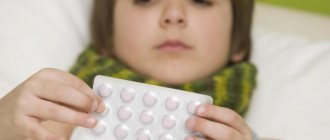Every modern mother once faces the question of whether or not to vaccinate her baby. And most often the reason for fear is the reaction to the vaccine. A sharp rise in temperature after vaccination is not a rare occurrence, and parents’ worries are completely justified. However, it is worth noting that in most cases this reaction is normal and there is no reason to panic.
Why is there a rise in temperature after vaccination, is it worth lowering it, and how to properly prepare for vaccination?
Why may the temperature rise after vaccination?
DPT vaccination is a “children’s” vaccine consisting of killed (inactivated) pertussis microbial agents, as well as adsorbed tetanus and diphtheria toxoids (sometimes components are added to them to develop immunity against rubella and polio). This drug, when entering the child’s body, causes a specific reaction similar to a mild form of an infectious disease. Such a process is nothing more than an immune response, signaling the creation of reliable protection against infections.
Any vaccine is a material foreign to humans, consisting of protein components. It is no secret that they are the most aggressive allergens, and therefore can provoke the occurrence of specific allergic reactions in the body, in particular, an increase in temperature.
Pediatricians always draw the attention of parents to the fact that after DTP vaccination, an increase in temperature is a standard phenomenon, and urge adults not to worry about this, but to take the necessary measures aimed at alleviating the condition of the vaccinated baby.
Vaccine administration schedule
In the first six months of life, when the basis of a child’s diet is mother’s milk, the most active formation of immunity occurs. Therefore, it is very important to start getting vaccinated with the DPT vaccine at this age.
Immediately after birth, doctors should notify new parents about upcoming vaccinations and even administer some of them. You will definitely need to write your agreement or refusal for this.
When to vaccinate:
- After birth:
- I hepatitis B - in the first 12-24 hours after birth.
- BCG - 3-7 days from birth.
- Up to 1 year:
- II hepatitis B - 1 month.
- I DTP and polio - at 3 months.
- II DTP and polio - at 4-5 months.
- III DTP and hepatitis B - at 6 months.
- Measles, rubella, mumps - at 12 months.
- After 1 year:
- DPT revaccination and polio – 1.5 years.
- Revaccination for polio – 20 months.
- II measles, rubella, mumps - 6 years.
- II revaccination with DPT, I revaccination with tuberculosis - 7 years.
- Hepatitis B, rubella - 13.
- III revaccination DPT polio – 14.
The body’s resistance to the administered substance, in particular to DPT, can be local and general. But it is not necessary for all the signs to manifest themselves. The child’s body may not express its attitude towards the vaccine in any way.
How does hyperthermia develop?
In most clinical cases, an increase in temperature after DTP vaccination is recorded 2-3 days after the injection. At the same time, immune bodies that enter the body stimulate the immune system and contribute to the development of protective forces that prevent possible infection. Along with antibodies to infection, prostaglandins, interleukins, cytokines and interferon are synthesized in the child’s body. These compounds are among the substances that reduce heat transfer and provoke an increase in temperature.
Consequently, the body itself raises its temperature in response to the vaccine. This happens because most pathogenic microorganisms react poorly to hyperthermia, and antibodies are more actively produced in the blood precisely under high temperature conditions.
How can you alleviate your baby's condition at home?
If your baby has a fever, feels unwell, and refuses to eat, then you need to try to alleviate his condition.
You can use Ibuprofen and Paracetamol on your own. These are safe drugs that help lower the temperature well without causing adverse reactions. Ibuprofen and Paracetamol are available in different forms: syrups, suppositories, tablets.
If vomiting occurs due to fever, you should use suppositories, and if you have diarrhea, use syrup. The effectiveness of the medicine will be higher if you consume enough fluid.
It is important to choose the correct dosage of medication for the child. Therefore, you should first consult with your pediatrician.
It happens that after vaccination, hyperthermia develops rapidly and it is not possible to overcome it on your own due to severe vasospasm. Then you need to call an emergency team.
When trying to help your child at home, it is important to remember that at high temperatures you cannot:
- wipe the body with vinegar or vodka;
- give aspirin;
- supercool.
It is necessary to lower the temperature in the room, humidify the air and give plenty of fluids.
What vaccines can cause high fever?
Most often, an increase in temperature is diagnosed after vaccination with the following vaccine options:
- DTP vaccine, which causes a hyperthermic reaction to vaccination in 90% of cases, and is therefore considered the most reactogenic of the entire calendar;
- polio vaccine, which provokes a rise in temperature for 2-3 days to 380 C;
- live vaccine solutions against measles, rubella, mumps, when the temperature rises 6-14 days and even a month after vaccination, which is associated with a period of active growth of viral agents;
- The anti-tuberculosis vaccine rarely provokes an increase in temperature values.
Experts are convinced that a child’s fever that occurs in response to immunization is a completely normal reaction and does not need to be corrected with medical intervention. But there are rare cases when hyperthermia after vaccination represents a pathological component of the body's reactivity to the introduction of a vaccine. Such conditions occur if:
- a low-quality drug has entered the body;
- infection occurred during the administration of the vaccine;
- the time of vaccination was compared with the incubation period of another infectious disease;
- there was an allergic reaction of the body.
About the DTP vaccine
Adsorbed pertussis-diphtheria-tetanus vaccine (DTP) is a complex substance that contains “dead” cells of three types of infections. Immunization will allow you to avoid the unpleasant and sometimes severe consequences of these very dangerous pathologies.
Only thanks to the regularity of the procedure for all children, it was possible to make these diseases almost a relic of the past.
Diphtheria - affects the nervous system and heart muscle, causing myocarditis. Occurs between 3 and 8 years of age.
Whooping cough lives in the mucous membrane of the respiratory tract. It usually manifests itself as a cough, but can provoke respiratory dysfunction, resulting in hypoxia and poor circulation in the brain. Mostly a childhood disease.
Tetanus - negatively affects the functioning of the nervous system. Provokes numerous convulsions.
If untimely or improper treatment is used, all three diseases can result in death.
Worth knowing! In Russia, one of two DTP drugs is administered: Pentaxim or Infanrix.
Is it necessary to deal with post-vaccination hyperthermia?
Pediatricians insist that fever after DTP vaccination or any other vaccination is an absolutely undesirable phenomenon that must be immediately eliminated and even prevented. Sometimes, to prevent hyperthermia, doctors recommend giving babies antipyretic (fever-reducing) drugs on the first day after the injection. This should be done after DTP vaccination.
Naturally, you should not immediately use medications if there is no indication for this. It is recommended to lower the temperature when it increases to 37.80 C or more. It is also important to prevent thermal indices from rising above 38.50 C, as this can cause serious complications. The advisability of using medications also depends on how long the child’s fever lasts. If after the injection the low-grade fever does not go away for several days, the baby should be given medicine and call a doctor.
How to prepare for vaccination
Every young mother knows about the existence of a vaccination calendar. The vaccination schedule is sometimes changed, but the mandatory vaccinations remain unchanged: vaccination against whooping cough, diphtheria and tetanus, tuberculosis, hepatitis, mumps, polio and rubella. Some vaccinations are given once, others in several “stages”.
Vaccination calendar for children under one year old
Attention! If parents do not want to vaccinate their baby, they can write a refusal. It is better to think carefully about this decision and weigh all the arguments. Without vaccinations, a child may have difficulty going to kindergarten and school, and even going on vacation to a children's camp or abroad.
If there is a vaccination, the baby must be prepared for it. This will help smooth out the reaction to the vaccine.
- The child should not be sick in the next 2-4 weeks before vaccination. On the day of vaccination, he must also be completely healthy. Moreover, “completely” means completely. Even a beginning runny nose or a slightly hoarse voice is a reason to postpone vaccination;
- During the week before vaccination, you should not experiment with complementary foods or new foods. After vaccination, it is also better to spend a week on your usual diet;
- If the baby has chronic diseases, before vaccination it is necessary to undergo tests to check the condition of the body;
- If your child has allergies, you can start giving an antihistamine (for example, Fenistil drops) a couple of days before the vaccination and continue giving it for a few more days after;
- Vaccination is given only after examination by a pediatrician. The pediatrician must make sure that the child has a normal temperature (36.6 degrees) and there are no visible signs of illness, and also ask the mother about the baby’s condition in recent days. Unfortunately, such examinations are often carried out very formally. And yet, the mother, not the doctor, is responsible for the child’s health, so if the mother is not satisfied with the examination, there is no need to hesitate to ask the doctor to take the temperature and examine the child properly.
Reading on the topic:
- What is the normal body temperature for an infant (36 - 37.3 °C - in the armpit; 36.6 - 37.2 °C - oral temperature; 36.9 - 38 °C - rectal temperature);
- Parents are often worried when they discover that their infant has a temperature of 37 degrees or even higher. Elevated temperature is perceived as a sign of illness, it seems that the baby requires mandatory and immediate treatment - 37 ºC - normal or not
- How to take a newborn baby's temperature. Where is it better to measure (in the armpit, rectally in the rectum, in the ear) and with what thermometer?
When is it absolutely forbidden to vaccinate?
Some factors are a categorical contraindication for vaccination. So, you can’t get vaccinated if:
- the child weighs less than 2 kg (this applies only to the BCG vaccination);
- previous vaccination resulted in complications;
- the baby has malignant oncological diseases;
- the child suffers from congenital or acquired immunodeficiency;
- the child has a severe allergy to chicken protein, baker's yeast (contraindication for vaccination against hepatitis B) and aminoglycoside antibiotics;
- the baby is prone to seizures and has diseases of the nervous system (contraindication to DTP vaccination);
- there is an exacerbation of a chronic disease or the baby has caught an infection, and it is still in the acute phase (vaccination is not canceled, but is temporarily postponed);
- the child has recently returned from a long trip and has not yet adapted to the previous climate;
- the child has epilepsy and has recently had a seizure (vaccination is postponed for 1 month).
How to lower the temperature correctly?
The use of antipyretic drugs is recommended in the following cases:
- in order to prevent an increase in temperature after DTP vaccination (Paracetamol is used in the form of suppositories at night);
- when the fever is maintained at 380 C or higher (the use of Ibuprofen in syrup is indicated);
- if there is no effect after taking conventional antipyretics (give Nimesulide in syrup or solution).
If the temperature persists, at the same time the child can be wiped with vinegar and given drugs to drink, the action of which is aimed at restoring the balance of water and electrolytes (Regidron, Gidrovit). Naturally, all prescriptions must be individual and carried out only after agreement with the doctor.
After the introduction of the vaccination material, it is prohibited:
- walk with your child outside and give him a bath;
- give aspirin for preventive purposes;
- introduce new food products into the diet;
- Wipe the baby with vodka or alcohol solutions.
Hyperthermia in infants
Fever after DPT vaccination in infants is diagnosed less frequently than in older children. When determining it, it should be taken into account that normally in babies in the first months of life it can reach 37.30 C.
Measurements are taken primarily rectally or orally using a pacifier. It is important to consider that the temperature in infants often rises after swimming, gymnastics, walking outside, and the like.
It is necessary to bring down hyperthermia in an infant even when its levels are insignificant (from 37.50 C). This is due to the fact that in children the hyperthermic reaction is prone to rapid and rapid development. To reduce fever in small children under 12 months, antipyretics such as Paracetamol and Ibuprofen are used, taking into account the permissible daily doses.
What to do if a baby has hyperthermia after immunization
After vaccination, the baby’s condition must be monitored. In the first 3-5 days, it is necessary to regularly monitor the thermometer readings. If they increase slightly, then you can do without the use of antipyretic drugs. It is enough to provide the child with plenty of fluids and create a comfortable environment.
It is necessary to shoot down in the following cases:
- the thermometer reading has exceeded 38.5, and the child’s health is deteriorating;
- the baby had previously had seizures, and the thermometer after the vaccination reached 37.5 degrees;
- the baby has neurological disorders;
- the child is prone to white fever.
If after vaccination a child has a temperature of 40, you should not experiment and try to cope with the problem yourself. It is better to call an ambulance and use the help of a team of doctors.
When is medical help needed?
It is necessary to contact your child with a doctor if you suspect an abnormal post-vaccination reaction. Among such pathological changes are:
- hyperthermia above 38.50 C, the risk of developing convulsive syndrome increases;
- the temperature is accompanied by a skin rash or signs of allergies;
- the fever is not reduced by the recommended antipyretic dosage forms;
- a sharp hyperthermal jump not associated with other pathologies;
- the injection site is swollen and red, the wound has transformed into an ulcer from which pus or bloody exudate flows.
In order for a child to easily endure the consequences of vaccination, he needs to create the most comfortable conditions. To do this, it is important to monitor the level of temperature and humidity in the room, go straight home from the clinic, ventilate the room twice a day when the baby is not in it, wet clean surfaces and floors, and limit contact with other children. The nature of feeding the baby is also important. In the first days after vaccination, you should not offer him new complementary foods or feed him often and tightly. At this time, you need to surround the child with attention and care, which will help him cope with all the difficulties.

